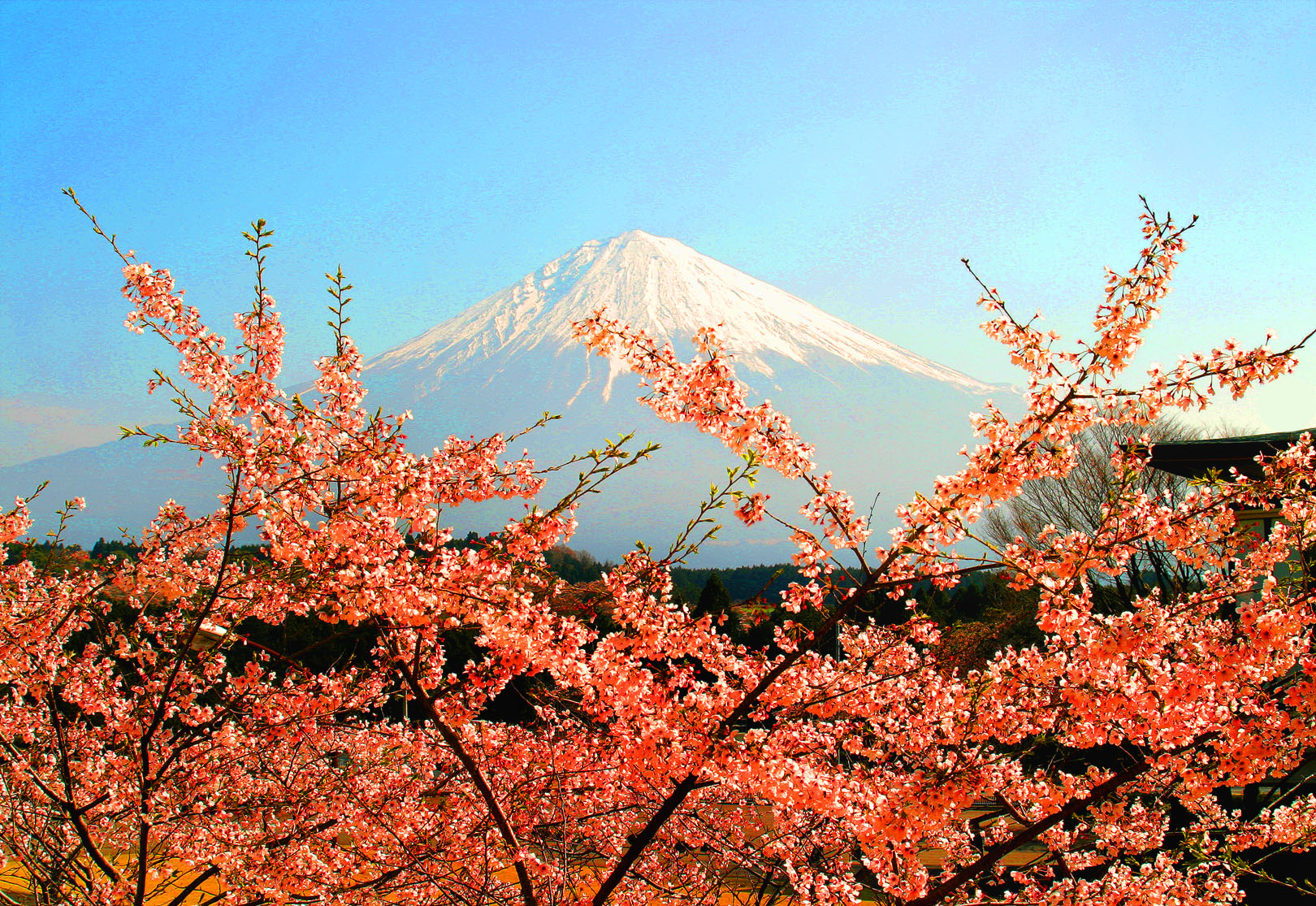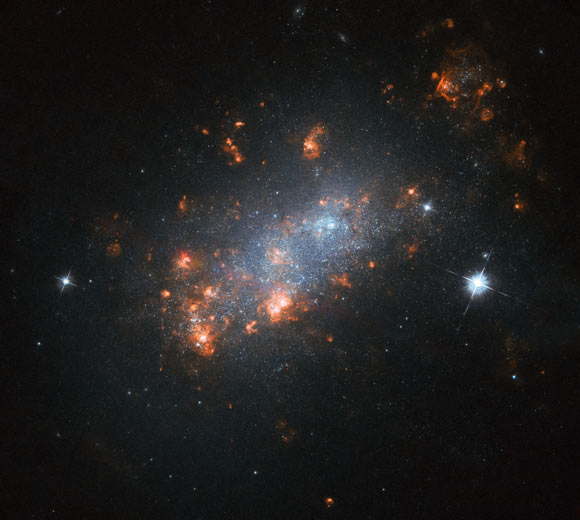
Sakura and Fuji
Celestial Cherry Blossoms
ω
The poet Basho, whose name is acclaimed
worldwide for haiku esteemed,
wrote myriad works for their greatness famed
and frequently nature themed.
Japan in the sixteen hundreds was where
his lyric verses were penned
mid trips solitary in open air
which continued till his end.
An evocative poem he composed
has a ‘cherry blossoms cloud’
and ‘gleam in the treetops of blooms’ disclosed,
by ‘a moonlit night’ endowed.
Such vivid pictures can senses transfix
through images that arise,
just as with NGC One One Five Six
espied in celestial skies.
This galaxy looks much like a cherry
tree its blossoms showering,
but with stellar newborns making merry
in the bliss of flowering.
Sprightly light from the starlets outward flows
meeting with hydrogen gas,
which causes those colorful pinkish glows
through its interactive pass.
Based in Aries, the Ram, Constellation,
this galaxy dwarf loner
has avoided a merger formation
with any neighbor donor.
Still, its rotational strangeness and shape
suggest that in times of yore
perhaps a close brush or narrow escape
left its chaos from before.
Thus astronomers find it appealing
as galaxy to study
for the oddness this dwarf is revealing
among its bright blooms ruddy.
Exposures separate render each hue
from varied wavelengths assigned
to the captures portrayed through filters two
in the Hubble view combined.
This posy grouping with nurseries star
of many an astral birth
is some twenty-five million light-years far
away from the Planet Earth.
Yet here is where true cherry blossoms grow
their fleeting beauty admired
in delicate dance of seasonal show,
which cosmic captions inspired.
And when my creative muses are stirred
like petals seized by a breeze,
I must follow the inner call that’s heard
wherever its path may please.
To Basho paraphrase as at the start
from a passage he professed:
‘Ere the light things give off dies in the heart,
it needs to be first expressed.’
~ Harley White
* * * * * * * * * *
Some sources of inspiration for the poem are the following…
The great 17th-century Japanese poet Basho wrote, “Before the light that things give off dies in the heart, it must be expressed.” ~ Quotation shown above the AWB AstroPoetry Blog…
Hubble Peers at Galactic Cherry Blossoms...
Poem by Basho Matsuo...
NGC 1156...
Hubble Views Lonely Dwarf Galaxy: NGC 1156...
Further inspiration derived from the teachings and writings of Nichiren Daishōnin…
How swiftly the days pass! It makes us realize how few are the years we have left. Friends enjoy the cherry blossoms together on spring mornings, and then they are gone, carried away like the blossoms by the winds of impermanence, leaving nothing but their names. Although the blossoms have scattered, the cherry trees will bloom again with the coming of spring, but when will those people be reborn? The companions with whom we enjoyed composing poems praising the moon on autumn evenings have vanished with the moon behind the shifting clouds. Only their mute images remain in our hearts. Though the moon has set behind the western mountains, we will compose poetry under it again next autumn. But where are our companions who have passed away? Even when the approaching tiger of death roars, we do not hear and are not startled. How many more days are left to the sheep bound for slaughter?
~ Nichiren Daishōnin
From: ‘Letter to Niike’, written in the second month of 1280…
Nam Myōhō Renge Kyō means to devote our lives to and found them on (Nam[u]) the Utterness of the Dharma (Myōhō) [entirety of existence, enlightenment and unenlightenment] permeated by the underlying white lotus flower-like mechanism of the interdependence of cause, concomitancy and effect (Renge) in its whereabouts of the ten [psychological] realms of dharmas [which is every possible psychological wavelength] (Kyō).
The reason that we continually recite Nam Myōhō Renge Kyō
Image explanation ~ The NASA/ESA Hubble Space Telescope has produced a beautiful image of the dwarf irregular galaxy NGC 1156, one of the best targets to study the isolated dwarf galaxies in the nearby Universe. The image snapped by the NASA/ESA Hubble Space Telescope reveals a detailed view of NGC 1156. The color image was made from separate exposures taken in the visible region of the spectrum with Hubble’s Advanced Camera for Surveys. Two filters were used to sample various wavelengths. The color results from assigning different hues to each monochromatic image associated with an individual filter.

Credit: NASA / ESA / Hubble / R. Jansen
| Table of Contents |
|

